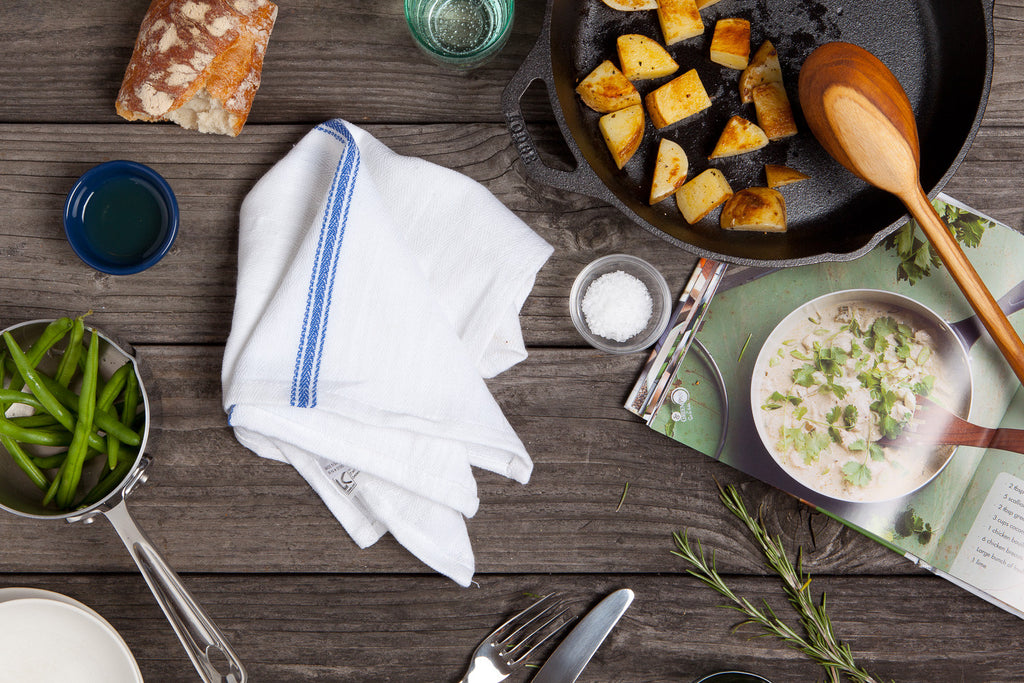“Let’s go, let’s go, let’s go!” Boulud yells, bounding into the kitchen and effortlessly taking control. To an idle chef he says, “Grab some towels! Grab some tools! You’re in a kitchen now!”
See what Boulud said there? He didn't say "Grab that blender!" He didn't even say to grab a knife. He told the chef to get his towels.
Why? Because the kitchen towel is more powerful than any appliance. It's part of the essential equipment trifecta: a sharp knife, a strong cutting board, a good kitchen towel, and you're ready to start cooking.
But first, you have to know how to use it. I know, I know, it sounds ridiculous. Who doesn't know how to use a towel? But there's technique to the towel. Let's dive in.
WHAT'S A KITCHEN TOWEL?
Let's start with what isn't. If it sports cute sayings or drawings of birds—in other words, if it can be bought on Etsy—it's not a kitchen towel. Those are dish towels. Use them for drying dishes.
A kitchen towel is plain, usually white, often with a stripe, and very utilitarian. They are absorbent and durable and should be available in bulk, because you need a clean one every time you cook. A good set to buy is this one, which Rhoda, our food editor, uses at home.
ONE TOWEL OR TWO? (OR THREE?)
Many cooks I know start with two clean towels—one dry, the other slightly damp (for tougher, stickier foods such as honey or garlic). Still other cooks slip a damp towel under their cutting board to prevent it from slipping, which brings their towel total to three. I think two towels, folded into neat rectangles and sitting on the edge of your cutting board, is optimal, setting you up to handle almost any cooking situation. But if you choose to start with one towel, make it dry.
THE POWER MOVES
There are three power moves for a kitchen towel: The Swoosh, The Swipe and The Grab. These moves keep you cooking cleaner and safer. But the real power in the towel is that all these moves end up saving you lots of time.
The Swoosh is simple: Every time you finish a task on your cutting board, grab your dry towel and swoosh away the clutter. Onion skins, rosemary stems, flour—it all gets swiftly swooshed into the trash or a trash bowl, leaving you with a clean, uncluttered surface to work with. Got sticky garlic on your board? Don't run to the sink and wash it—use your damp towel.
The Swipe is to your knife what the Swoosh is to your cutting board. Tomato seeds, cake crumbs—whatever is sticking to the blade gets swiped clean. You can do this one of two ways: Pick up the towel and run it against the knife, or keep the towel folded into a nice little package and run the knife's blade against it. Either way, if you do this after every task you won't need to rinse your knife constantly. Which, again, sounds like a small thing, but the time you'll save will add up into something big.
(A statement of the obvious: Any board or knife that has come into contact with raw meat or poultry needs to be thoroughly cleaned with soap before you can use it again. Likewise, towels that come into contact with raw meat/poultry should be put out of rotation immediately until laundered.)
The Grab is also simple: Just fold the dry towel over itself until it is the thickness of a pot holder and grab that cookie sheet in the oven, that cast-iron pan on the stove or that foil-wrapped potato in the toaster oven. Now throw away your pot holders, because you don't need those things anymore.
But that's just the beginning. Once you master these three basic moves, you'll be ready to graduate to even more specialized towel moves like these:
The Twist helps you use the towel as cheesecloth. Put shredded potatoes or apples, just-cooked spinach or anything else you need to squeeze moisture out of in the center of the towel. Gather the ends together to form a pouch. Now twist the ends of the pouch like a Tootsie Roll wrapper, tightening it until you've squeezed the liquid out.
The Dab saves you from lugging out the salad spinner. Simply dab wet herbs and lettuces gently with your clean towel until dry. Even better, wrap your just-washed greens in a towel and store in the fridge until dinnertime. They'll turn extra-crunchy as they dry.
The Shape. Hat tip to our food editor, Rhoda, on this one: When pie dough needs to be patted into shape before rolling, wrap it loosely in a clean towel and use it as a barrier between the cool dough and your warm hands.
The Dry. Oh yes, kitchen towels work for drying, too. Did we forget to mention that?

